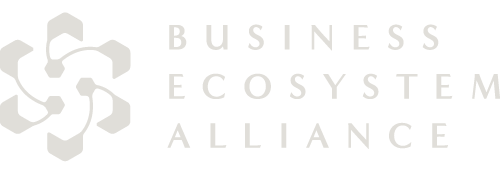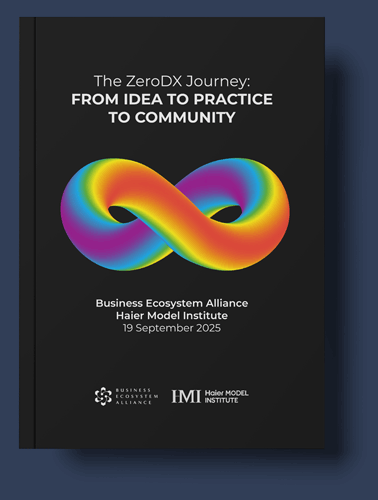
RENDANHEYI, THE MANAGEMENT PHILOSOPHY OF OUR TIMES
The Business Ecosystem Alliance is delighted to be partnering with MLab and Haier Model Institute on the ZeroDX Awards. Our friends at Goodwill worked with us to create this brilliant intro video, which was aired at the 8th RenDanHeYi Model Leading Forum and the Inaugural ZeroDX Awards event in Qingdao, China on 20 September 2024.
VIDEO TRANSCRIPT
Management is universal. Management is timeless. It took management to build the pyramids, to build the Great Wall of China, and it takes management to build and run the great organizations of our high-tech times.
Innovative, progressive management, which achieves personal and organizational results, is an enormous competitive advantage.
This event today, the 8th annual forum, is about sharing, understanding, and advancing truly progressive management. It is about learning lessons from best practice and being inspired by the potential to create fantastic humane organizations, which deliver extraordinary results in our turbulent and hypercompetitive times.
Make no mistake, we face some big challenges as businesses, organizations, and societies.
Listen to Gary Hamel:
‘As human beings, we’re up against some very, very daunting challenges and to meet those challenges we’re going to need institutions that are radically more capable than the ones we have right now. But in any case in the future of management, I’d argue that in this hyperkinetic world we needed organizations that could change as fast as change itself, that were infused with the spirit of entrepreneurship, that were more lateral than they were kind of vertical, and that was a big ask.’
Though our times are fast moving and complex, at the heart of business and of management are simple concepts.
How we understand and relate to customers has changed. The gap between employees and customers is now vanishingly small.
In their book Proximity, Rob Wolcott and Kaihan Krippendorff map out this fast-changing relationship, a world of instant fulfilment:
‘So digital technologies are pushing the production and provision of value closer and closer to the moment of demand — not predicted demand, not hope for demand, but actually proven ready to buy demand. So that’s the first element that we see in the RenDanHeYi model is that we’re producing closer to when something is needed.
The second thing that is really interesting is customization and customization at scale. We’re able to customize physical and digital products more rapidly, more precisely, and in smaller quantities, becoming economical and the premium that people are willing to pay for customized products is increasing, the economics are changing, and so that’s another thing that we see in the RenDanHeYi model.’
For Haier, narrowing the gap between employees and consumers has become a guiding philosophy. Its concept of zero distance emphasizes the connection between the business and the end user or customer. This has become central to the management model over the Internet of Things era . This is how Zhang Ruimin, founder of the Haier group, explains the RenDanHeYi model, which is the overall management philosophy of the company, one he initiated and continues to help develop.
[Mandarin Chinese — Zhang Ruimin’s full speech with translation available here]
RenDanHeYi is a management philosophy for our times. We live and work in an ecosystem economy. In an era driven by the internet, the Internet of Things, and artificial intelligence technologies, an ecosystem economy is the economic model. This forces organizations to transform from hierarchical structures to complex adaptive systems that are self-organizing.
Haier has pioneered a truly progressive management model which has transformed its fortunes and those of all in its ecosystem, but it is not alone. Progressive organizations can be found throughout the world.
Here are the thoughts of Professor Mark Greeven from IMD:
‘I’ve been studying the rising importance and practice of business ecosystems for almost two decades now. It is a pleasure to see so many progressive organizations and leaders coming together to discuss the importance and also the implementation of ecosystems. The idea of ecosystems is really to create a future together through our ecosystem rather than just alone as a company.
We see that the future of ecosystems is increasingly interactive and intelligent. The purpose of an ecosystem is to maximize the value for everybody involved in the ecosystem: the complementors, the users, ourselves, the employees. Everybody involved maximizes their value if we do this in an interactive and intelligent way. We are actually preparing our organization to move away from a hierarchy and a bureaucracy to a much more adaptive complex system that fits the times that we are living in today.’
The Haier Model Institute has partnered with the Business Ecosystem Alliance and the Management Lab to identify progressive companies which are putting zero distance and related ideas into practice. These organizations are characterized by:
- A highly decentralized structure with minimal formal hierarchy.
- Self-managing teams with autonomy and authority to make decisions directly interacting with customers.
- Teams accountable for their results, with all employees sharing in the organization’s success.
This is what progressive organizational futures look like. The challenge is clear: to create a new engine to power the ecosystem economy; to move forward with the management philosophy embodied in RenDanHeYi, but never ever to stand still; to constantly change, improve, and develop; to create RenDanHeYi 2.0.
So let today be a celebration but also a start.
About the author:
Stuart Crainer is the cofounder of Thinkers50.


